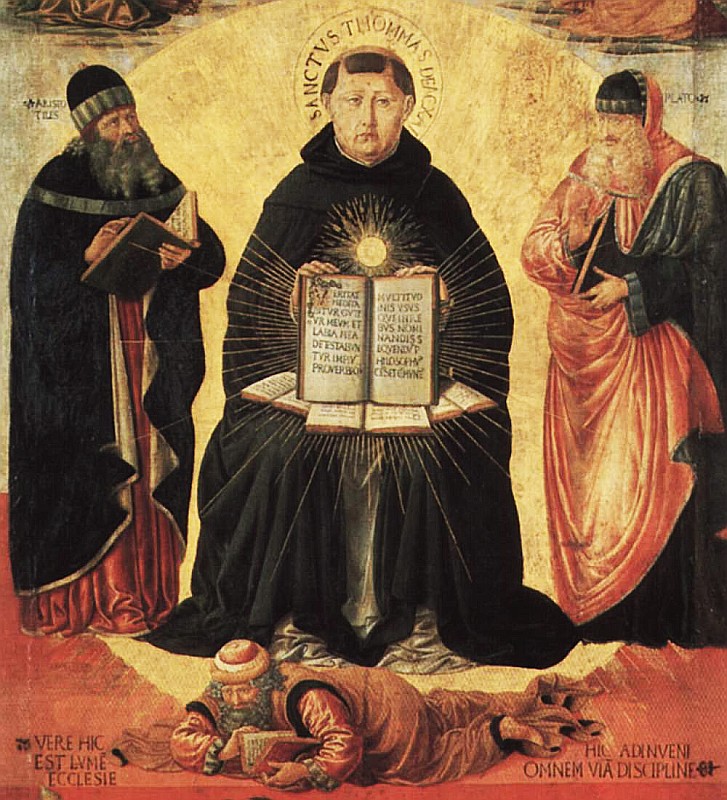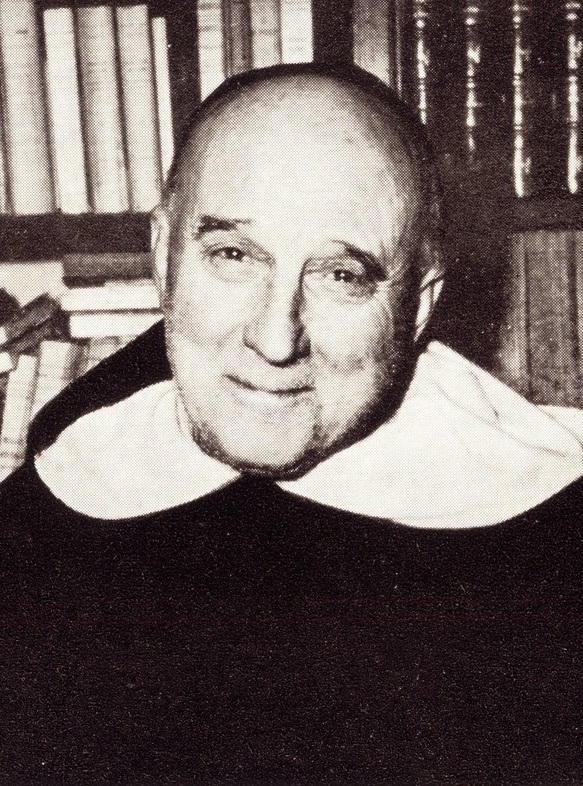From St. Thomas's Summa Theologiae, I.1.2c and ad 2:
Objection 2. Further, no science deals with individual facts. But this sacred science treats of individual facts, such as the deeds of Abraham, Isaac and Jacob and such like. Therefore sacred doctrine is not a science.
I answer that, Sacred doctrine is a science. We must bear in mind that there are two kinds of sciences. There are some which proceed from a principle known by the natural light of intelligence, such as arithmetic and geometry and the like. There are some which proceed from principles known by the light of a higher science: thus the science of perspective proceeds from principles established by geometry, and music from principles established by arithmetic. So it is that sacred doctrine is a science because it proceeds from principles established by the light of a higher science, namely, the science of God and the blessed. Hence, just as the musician accepts on authority the principles taught him by the mathematician, so sacred science is established on principles revealed by God.
Reply to Objection 2. Individual facts are treated of in sacred doctrine, not because it is concerned with them principally, but they are introduced rather both as examples to be followed in our lives (as in moral sciences) and in order to establish the authority of those men through whom the divine revelation, on which this sacred scripture or doctrine is based, has come down to us.
Praeterea, scientia non est singularium. Sed sacra doctrina tractat de singularibus, puta de gestis Abrahae, Isaac et Iacob, et similibus. Ergo sacra doctrina non est scientia.
Respondeo dicendum sacram doctrinam esse scientiam. Sed sciendum est quod duplex est scientiarum genus. Quaedam enim sunt, quae procedunt ex principiis notis lumine naturali intellectus, sicut arithmetica, geometria, et huiusmodi. Quaedam vero sunt, quae procedunt ex principiis notis lumine superioris scientiae, sicut perspectiva procedit ex principiis notificatis per geometriam, et musica ex principiis per arithmeticam notis. Et hoc modo sacra doctrina est scientia, quia procedit ex principiis notis lumine superioris scientiae, quae scilicet est scientia Dei et beatorum. Unde sicut musica credit principia tradita sibi ab arithmetico, ita doctrina sacra credit principia revelata sibi a Deo.
Ad secundum dicendum quod singularia traduntur in sacra doctrina, non quia de eis principaliter tractetur, sed introducuntur tum in exemplum vitae, sicut in scientiis moralibus; tum etiam ad declarandum auctoritatem virorum per quos ad nos revelatio divina processit, super quam fundatur sacra Scriptura seu doctrina.
From Garrigou-Lagrange, Reality, Ch. 6: The Nature of Theological Work:
Article One: The Proper Object Of Theology
Theology is a science made possible by the light of revelation. Theology, therefore, presupposes faith in revealed truths. Hence the proper object of theology is the inner life of God as knowable by revelation and faith. By this object theology rises above metaphysics, which sees in God the first and supreme being, the author of nature, whereas theology attains God as God (sub ratione Deitatis). [246].
How does theology differ from faith? The object of theology, in the theologian who is still viator, is not the Deity clearly seen, [247] as in the beatific vision, but the Deity known obscurely by faith. [248] Theology, then, is distinguished from faith, which is its root, because theology is the science of the truths of faith, which truths it explains, defends, and compares. Comparing these truths with one another, theology sees their mutual relations, and the consequences which they virtually contain. But to use this method for attaining its proper object, the inner life of God as God, theology must presuppose metaphysics which sees God as the Supreme Being. That this is the object of metaphysics is clear, we may note, from revelation itself. When God says to Moses: "I am who am," [249] we recognize in those words the equivalent statement: God alone is subsistent existence. [250].
Theology, therefore, though here below it proceeds from principles which are believed, not seen as evident in themselves, is nevertheless a branch of knowledge, a science in the proper sense of the word. The characteristic of science is to show "the reason why this thing has just these properties." Theology does just that. It determines the nature and properties of sanctifying grace, of infused virtue, of faith, of hope, of charity. St. Thomas, in defining theology, uses the Aristotelian definition of science which he had explained in his commentary on the Later Analytics. [251] To know scientifically, he says, is to know this thing as what it is and why it cannot be otherwise. Theology then is a science, not merely in the broad sense of certain knowledge, but also in the strict sense of conclusions known by principles. [252].
Such is theology here below. But when the theologian is no longer viator, when he has received the beatific vision, then, without medium, in the Word, he will behold the inner life of God, the divine essence. Then he will know, with fullest light, what before he knew by faith. And beyond that, extra Verbum, he will see the conclusions derivable from faith. In heaven, theology will be perfect, its principles evident. But here below, theology is in an imperfect state. It has not, so to speak, become adult.
Hence theology, as attainable here below, while it is a science, and is a sub-alternate science, resting on the mind of God and the blessed in heaven, is nevertheless, when compared with all merely human knowledge, a wisdom specifically higher than metaphysics, though not as high as the infused faith which is its source. Theology then, generated by the theological labor, is by its root essentially supernatural. [253] If, consequently, the theologian loses faith (by grave sin against that virtue): there remains in him only the corpse of theology, a body without soul, since he no longer adheres, formally and infallibly, to revealed truths, the sources of the theological habit. And this is true, even if, following his own will and judgment, he still holds materially one or the other of these truths.
So much on the nature of theology. We must now consider the different steps, the different procedures, to be followed by the theologian, if he would avoid opposed and exaggerated extremes.
ARTICLE I. - L'objet propre de la théologie.
Nous supposons ici - ce qu'expose saint Thomas dans la q. I de la Somme théologique - que la théologie est à proprement parler une science qui procède sous la lumière de la Révélation divine, qui suppose donc la foi infuse aux vérités révélées, et qui a pour objet propre Dieu considéré en sa vie intime, comme auteur de la grâce, Dieu tel que la révélation et la foi nous le font connaître, et non pas seulement Dieu auteur de la nature, accessible aux forces naturelles de notre raison. Il ne s'agit pas seulement de Dieu sub ratione entis et primi entis, auquel parvient la métaphysique, science de l'être en tant qu'être, mais de Dieu sub ratione Deitatis, comme il est dit Ia, q. I, a. 6 :
Sacra doctrina propriissime determinat de Deo, secun dum quod est altissima causa : quia non solum quantum ad illud quod est per creaturas cognoscibile (quod philosophi cognoverunt, ut dicitur Rom., I, 19 : Quod notum est Dei, manifestum est illis), sed etiam quantum ad id, quod notum est sibi soli de seipso et aliis per revelationem communicatum.
La théologie, chez le théologien encore viator, ne porte pas sur la Déité clare visa, comme la vision béatifique, mais sur la Déité obscure per fidem cognita; et elle se distingue pourtant de la foi, qui est comme sa racine, parce qu'elle est une science des vérités de la foi qu'elle doit expliquer et défendre par la méthode d'analogie. Elle cherche à découvrir leur subordination en un corps de doctrine et à déduire les vérités qu'elles contiennent virtuellement.
En ce travail la théologie ne peut se servir de la méthode d'analogie dans l'explication des vérités relatives à la vie intime de Dieu, ad ipsam Deitatem ut sic, sans recourir à ce que la métaphysique nous dit de Dieu comme premier être, sub ration entis. Du reste cela même est révélé, en particulier lorsque Dieu dit à Moïse : Ego sum qui sum, vérité qui est l'équivalent de cette formule : Solus Deus est ipsum Esse subsistens.
Bien qu'ici-bas la théologie procède de principes non évidents, des principes de foi, elle est pourtant une science au sens propre de ce mot, car elle déter mine « la cause pour laquelle telle chose a telles pro priétés et non pas telles autres » ; c'est ainsi qu'elle détermine la nature et les propriétés de la grâce sanctifiante, des vertus infuses en général, de la foi, de l'espérance, de la charité, etc. Saint Thomas en somme applique à la théologie la définition aristoté licienne de la science, qu'il a expliquée dans son commentaire des Posteriora Analytica, 1. I, lect. 4: Scire est cognoscere causam propter quam res est et non potest aliter se habere. La science se dit au sens large de toute connaissance certaine ; elle se dit au sens propre de la connaissance des conclusions par les principes. Cf. R. Gagnebet, O. P., La nature de la théologie spéculative, dans Rev. thom., 1938, n. 1 et 2 (extrait, p. 78), et 1939, p. 108-147.
Lorsque le théologien ne sera plus viator, lorsqu'il aura reçu la vision béatifique, il verra immédiatement in Verbo, la vie intime de Dieu, la Déité ou essence divine ; il atteindra en pleine lumière les vérités qu'il connaissait d'abord par la foi, et il pourra encore voir extra Verbum les conclusions qui peuvent s'en déduire. Au ciel la théologie existera à l'état parfait avec l'évidence des principes, in via elle existe à l'état imparfait, elle n'a pas encore l'âge adulte pour ainsi parler.
Il suit de là pour saint Thomas et son école que la théologie est une science subalternée à celle de Dieu et des bienheureux, qu'elle est aussi une sagesse, spécifiquement supérieure à la métaphysique, mais inférieure à la foi infuse ; elle est un habitus acquis par le travail, mais dont la racine est essentiellement surnaturelle, radix ejus est ipsa fides infusa. De la sorte, si le théologien vient à perdre la foi infuse par une faute grave contre cette vertu théologale, il ne reste plus en lui que le cadavre de la théologie, un corps sans âme, car il n'adhère plus formellement et infailliblement aux vérités révélées, principes de la théologie, il adhère tout au plus matériellement à celles de ces vérités qu'il veut garder ex proprio judicio et propria voluntate.
Si telle est selon saint Thomas et l'ensemble de ses interprètes la nature de la théologie, quels sont les divers procédés qui concourent au travail théologique et le constituent. Il importe de les bien distinguer les uns des autres, pour éviter les exagérations en sens opposés.
Notes:
246 This paragraph summarizes the first question in the Summa. See Ia, q. 1, a. 6.
247 Clare visa248 Obscure per fidem cognita249 Ego sum qui sum250 Deus solus est ipsum esse subsistens251 Bk. 1, lect. 4; Scire est cognoscere causam propter quam res est et non potest aliter se habere
252 Cf. R. Gagnebet, O. P.: "La nature de la theologie speculative" in Rev. thom.: 1938, nos. 1 and 2, p. 78; 1939, pp. 108-47
253 Radix ejus est ipsa fides infusa











